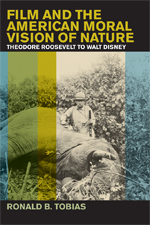

The Letters of Theodore Roosevelt constitute a major contribution to the field of American history and literature. At the same time, they present an autobiography of matchless candor and vitality. They are at once a mine of information for the historian, a case study in astute and vigorous political leadership, and a delight to the general reader. All the letters needed to reveal Roosevelt's thought and action in his public and private life are included, with appropriate editorial comment; and each is printed in its entirety.
With the addition of this final installment, about 6,000 letters will have been published out of the 100,000 which Theodore Roosevelt wrote between 1868 (when he was 10) and the day of his death in January, 1919. During the last ten years of his life Roosevelt plunged into the African jungle; he visited Kaiser Wilhelm II; he led the Progressive Movement, and as a Bull Moose was defeated in 1912—permitting Woodrow Wilson to defeat William Howard Taft for the Presidency. Then, explorer once again, he escaped with his life from the wilds of Brazil, campaigned for United States' participation in World War One, and died peacefully as his cousin was on the threshold of a dynamic career.
Theodore Roosevelt's letters are a treasury of information about the issues, the people, and the temper of his period. Here are available documents which tell of his thought and action in all the major and many of the minor undertakings of his public and private life. Each letter is printed in its entirety. Both in content and presentation, The Letters of Theodore Roosevelt constitute a contribution to the field of American history and literature whose value can hardly be exaggerated. At the same time they present an autobiography of matchless candor and vitality.

The Letters of Theodore Roosevelt constitute a major contribution to the field of American history and literature. At the same time, they present an autobiography of matchless candor and vitality. They are at once a mine of information for the historian, a case study in astute and vigorous political leadership, and a delight to the general reader. All the letters needed to reveal Roosevelt's thought and action in his public and private life are included, with appropriate editorial comment; and each is printed in its entirety.
With the addition of this final installment, about 6,000 letters will have been published out of the 100,000 which Theodore Roosevelt wrote between 1868 (when he was 10) and the day of his death in January, 1919. During the last ten years of his life Roosevelt plunged into the African jungle; he visited Kaiser Wilhelm II; he led the Progressive Movement, and as a Bull Moose was defeated in 1912—permitting Woodrow Wilson to defeat William Howard Taft for the Presidency. Then, explorer once again, he escaped with his life from the wilds of Brazil, campaigned for United States' participation in World War One, and died peacefully as his cousin was on the threshold of a dynamic career.
Theodore Roosevelt's letters are a treasury of information about the issues, the people, and the temper of his period. Here are available documents which tell of his thought and action in all the major and many of the minor undertakings of his public and private life. Each letter is printed in its entirety. Both in content and presentation, The Letters of Theodore Roosevelt constitute a contribution to the field of American history and literature whose value can hardly be exaggerated. At the same time they present an autobiography of matchless candor and vitality.

The Letters of Theodore Roosevelt constitute a major contribution to the field of American history and literature. At the same time, they present an autobiography of matchless candor and vitality. They are at once a mine of information for the historian, a case study in astute and vigorous political leadership, and a delight to the general reader. All the letters needed to reveal Roosevelt's thought and action in his public and private life are included, with appropriate editorial comment; and each is printed in its entirety.
In the letters of 1905–1909, Roosevelt’s “big stick” carries increasing weight at home and abroad. These are the years of the fleet’s cruise around the world, of trust-busting and railroad regulation and currency control, and the building of the Panama Canal. They include the Panic of 1907, “Nature Faking,” conservation, the choice of a successor, and the bitter conflict between President and Congress in the closing days of the administration.

The Letters of Theodore Roosevelt constitute a major contribution to the field of American history and literature. At the same time, they present an autobiography of matchless candor and vitality. They are at once a mine of information for the historian, a case study in astute and vigorous political leadership, and a delight to the general reader. All the letters needed to reveal Roosevelt's thought and action in his public and private life are included, with appropriate editorial comment; and each is printed in its entirety.
In the letters of 1905–1909, Roosevelt’s “big stick” carries increasing weight at home and abroad. These are the years of the fleet’s cruise around the world, of trust-busting and railroad regulation and currency control, and the building of the Panama Canal. They include the Panic of 1907, “Nature Faking,” conservation, the choice of a successor, and the bitter conflict between President and Congress in the closing days of the administration.


The Letters of Theodore Roosevelt constitute a major contribution to the field of American history and literature. At the same time, they present an autobiography of matchless candor and vitality. They are at once a mine of information for the historian, a case study in astute and vigorous political leadership, and a delight to the general reader. All the letters needed to reveal Roosevelt's thought and action in his public and private life are included, with appropriate editorial comment; and each is printed in its entirety.
In the letters of 1901–1905, Roosevelt consolidates his position as President and party leader, settles the coal strike, deals with the politics of the Panama Canal, expands the Navy, extends the sphere of American interests abroad, achieves the Presidency in his own right, and works with the Russians and the Japanese to make the Peace in Portsmouth.


The Letters of Theodore Roosevelt constitute a major contribution to the field of American history and literature. At the same time, they present an autobiography of matchless candor and vitality. They are at once a mine of information for the historian, a case study in astute and vigorous political leadership, and a delight to the general reader. All the letters needed to reveal Roosevelt's thought and action in his public and private life are included, with appropriate editorial comment; and each is printed in its entirety.
In the letters of 1901–1905, Roosevelt consolidates his position as President and party leader, settles the coal strike, deals with the politics of the Panama Canal, expands the Navy, extends the sphere of American interests abroad, achieves the Presidency in his own right, and works with the Russians and the Japanese to make the Peace in Portsmouth.

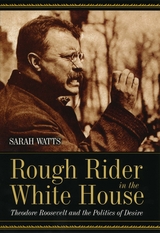
In this book, Sarah Watts probes this dark side of the Rough Rider, presenting a fascinating psychological portrait of a man whose personal obsession with masculinity profoundly influenced the fate of a nation. Drawing on his own writings and on media representations of him, Watts attributes the wide appeal of Roosevelt's style of manhood to the way it addressed the hopes and anxieties of men of his time. Like many of his contemporaries, Roosevelt struggled with what it meant to be a man in the modern era. He saw two foes within himself: a fragile weakling and a primitive beast. The weakling he punished and toughened with rigorous, manly pursuits such as hunting, horseback riding, and war. The beast he unleashed through brutal criticism of homosexuals, immigrants, pacifists, and sissies—anyone who might tarnish the nation's veneer of strength and vigor. With his unabashed paeans to violence and aggressive politics, Roosevelt ultimately offered American men a chance to project their longings and fears onto the nation and its policies. In this way he harnessed the primitive energy of men's desires to propel the march of American civilization—over the bodies of anyone who might stand in its way.
Written with passion and precision, this powerful revisioning of an American icon will forever alter the way we see Theodore Roosevelt and his political legacy.
"A superb scholarly study of how Roosevelt built his political base on the aspiration and fears of men in a rapidly changing nation and world."—Charles K. Piehl, Library Journal
"A thought-provoking and innovative study of the dark side of Roosevelt's personality. . . . [Watt's] arguments are clear, passionate, and thoroughly supported."—Elizabeth A. Bennion, Journal of Interdisciplinary History
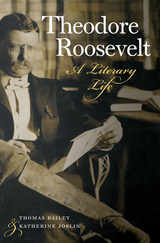
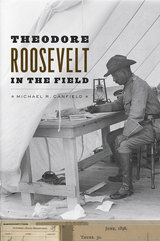
Drawing extensively on Roosevelt’s field notebooks, diaries, and letters, Canfield takes readers into the field on adventures alongside him. From Roosevelt’s early childhood observations of ants to his notes on ornithology as a teenager, Canfield shows how Roosevelt’s quest for knowledge coincided with his interest in the outdoors. We later travel to the Badlands, after the deaths of Roosevelt’s wife and mother, to understand his embrace of the rugged freedom of the ranch lifestyle and the Western wilderness. Finally, Canfield takes us to Africa and South America as we consider Roosevelt’s travels and writings after his presidency. Throughout, we see how the seemingly contradictory aspects of Roosevelt’s biography as a hunter and a naturalist are actually complementary traits of a man eager to directly understand and experience the environment around him.
As our connection to the natural world seems to be more tenuous, Theodore Roosevelt in the Field offers the chance to reinvigorate our enjoyment of nature alongside one of history’s most bold and restlessly curious figures.
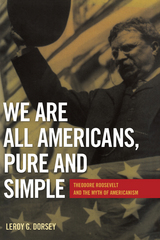
READERS
Browse our collection.
PUBLISHERS
See BiblioVault's publisher services.
STUDENT SERVICES
Files for college accessibility offices.
UChicago Accessibility Resources
home | accessibility | search | about | contact us
BiblioVault ® 2001 - 2024
The University of Chicago Press









